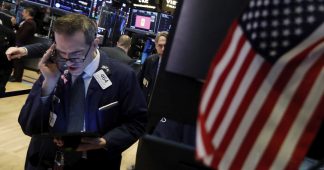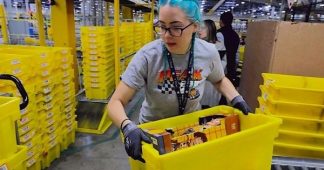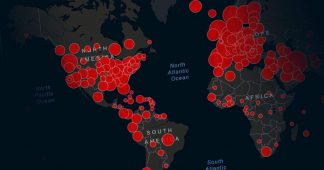By Helen Buyniski
23 Mar, 2020
Coronavirus has exposed stark divides in US society as the wealthy hole up in their homes and the poor are reduced to delivering their supplies in often-unsafe conditions. With mass layoffs underway, is class war imminent?
Coronavirus untouchables
New York warehouse workers at FreshDirect and Amazon – the two e-commerce giants emerging as the economic winners in the coronavirus epidemic for their near-monopoly on groceries and, well, everything else – tested positive for coronavirus last week, bringing into sharp focus the high-risk nature of their jobs. Along with gig economy workers – rideshare drivers, couriers, and food-service delivery people – and grocery clerks, the warehouse employees handling the surge in deliveries to pandemic shut-ins represent the “have-nots” of the new coronavirus caste system.
No job security, scant health insurance, and high likelihood of exposure to the virus – these jobs don’t come with much to recommend them, but employers can squash any rebellion by dropping a hint that workers are lucky to have a job at all. With so many newly-unemployed ex-bartenders, ex-waiters, and ex-retail workers trying to sign up for benefits that state websites are crashing, no one wants to join the ranks of the newly jobless – ranks that the Trump administration hinted earlier this week could swell to 20 percent of the labor force by the time the pandemic subsides.
Delivery and rideshare companies have been slammed for not providing their workers with basic personal protection supplies like hand sanitizer, masks, and disinfectant wipes, let alone bare-minimum benefits like paid sick leave. Some companies have grudgingly adopted a limited form of the latter – Amazon/Whole Foods, Postmates, and Uber are giving coronavirus-stricken workers two weeks’ paid leave – but only if they’ve received a diagnosis. Since the disease can take weeks to manifest symptoms, and tests remain hard to get (unless you’re a basketball player or a congressman), such penny-pinching is likely to boomerang, turning silently-infected gig workers who feel pressured to work until they drop into Typhoid Marys letting off their viral passengers at every stop.
Add in the fact that most restaurants and other businesses don’t even let delivery workers (or Uber drivers, or couriers) into their bathrooms to wash their hands, and swamped checkout clerks and warehouse workers rarely get to rendezvous with soap and water – and you have a viral nightmare waiting to happen.
Amazon cut healthcare benefits for part-time Whole Foods employees at the beginning of the year, and its stores have remained open even after employees turn up with the virus, with one New York location shuttering only long enough for a brief cleaning as panicked customers waited to pack the aisles. While Amazon has enacted a $2 per hour hazard-pay wage bump, the small bonus is hardly worth employees’ lives, nor will it cover the high costs of medical treatment for uninsured workers who do fall ill. Given CEO Jeff Bezos’ world’s-richest-man status – and Amazon’s pledge to bring in 100,000 new employees to deal with the coronavirus-related surge in business – the notion that the company can’t afford to treat its workers better rings hollow, and more workers are waking up to the sense that they’ve been cheated.
Exploitation on overdrive
Not everyone will get sick, of course. But everyone is getting pissed off. Employees at the megacorporation’s Queens warehouse refused to return to work on Wednesday night after learning their co-worker had tested positive for the virus, even as production quotas have soared with online shopping taking the place of retail stores that have closed in most metropolitan areas. Delivery workers report little, if any, increase in tips from oblivious customers, while Whole Foods clerks, reprimanded for trying to protect themselves by wearing masks on the job, are “crying and having panic attacks,” according to Motherboard.
Last month we fought Amazon to win our legally entitled sick leave. Tonight we shut down our warehouse to protect each other and our communities from #coronavirus and Amazon’s greed#AmazoniansUnited#allpowertothepeople pic.twitter.com/berCwEPABS
— Amazonians United New York City (@NYCAmazonians) March 19, 2020
And the rich are starting to feel the heat. Even those who have fled the cities for the relative calm of enclaves like the Hamptons (or designer bunkers in New Zealand) and spend their days jockeying for early access to the inevitable coronavirus vaccine are finding the natives restless. “We should blow up the bridges,” a ‘lifelong Montauker’ living a working-class life among eastern Long Island’s mansions told the New York Post, complaining about the waves of moneyed refugees stripping store shelves bare like a plague of Gucci-loafered locusts as they flee east from Manhattan. “Selfish. Disrespectful. Absolutely horrifying,” another concurred, while a third local complained about “these elitist people who think they don’t have to follow the rules.”
This narrative makes no sense
Imagine saying the country is going to get hit harder by coronavirus than the cities
It is just a hit on working class voters https://t.co/5e0rJT9QMn
— Jack M. Posobiec, IWO (@JackPosobiec) March 20, 2020
Even as those elites rub it in the working class’ faces, ostentatiously stockpiling supplies others can’t afford to buy in bulk and requesting (and getting) coronavirus tests when the masses simply can’t, they’re blaming the poor for not having access to those things. An Axios article published on Friday purported to show that “demographics, work patterns and media habits” of President Donald Trump’s blue-collar supporters put them at greater risk of coronavirus, carrying faint echoes of the condescending “learn to code” panacea infamously thrown at out-of-work coal miners by the media cognoscenti years ago.
Combine this class resentment with large-scale disillusionment with the political system and an unprecedented number of underemployed and unemployed people with a lot of time on their hands, and you have a recipe for full-on coronavirus class war. It took decades for the US to reach its current peak level of income inequality, decades in which the average person was too busy working to feel the promise of the American dream slipping through their fingers, but Americans will not be content to wait decades more for the situation to right itself. The rich have refused to be taxed – but next time the downtrodden masses are unlikely to ask nicely before taking what they feel they deserve.











